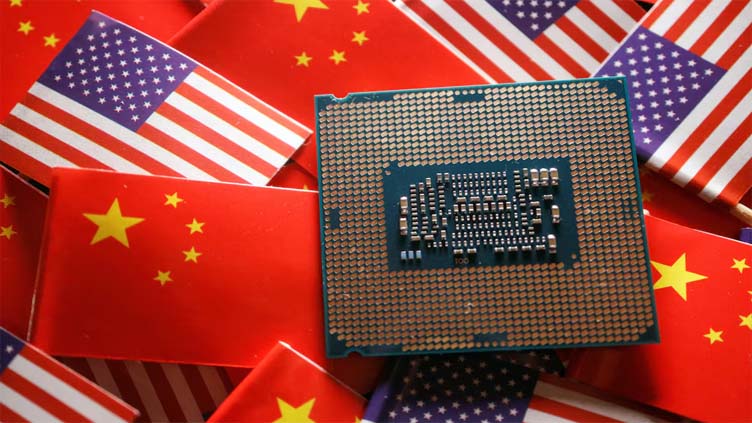Chip stocks volatile with China-US spat in focus

Technology
Asia chip stocks extend heavy selloff, U.S. trading choppy
NEW YORK/SINGAPORE (Reuters) - Trading in U.S. chip stocks was choppy on Thursday with the Philadelphia semiconductor index managing to close higher after tumbling on Wednesday with its biggest contributions from a handful of heavyweights Nvidia and Broadcom .
Chip stocks in Asia had sold-off earlier in Thursday after a report that the United States was considering tighter curbs on exports of advanced chip technology to China.
Bloomberg News had reported that U.S. President Joe Biden's administration was weighing a measure called the foreign direct product rule that would allow the U.S. to stop a product from being sold if it was made using American technology.
After the report the Global X Asia Semiconductor exchange-traded fund closed down 1.74% on Thursday with declines in major holdings including SK Hynix, Tokyo Electron, Taiwan Semiconductor Manufacturing Co and Samsung Electronics.
The Philadelphia Semiconductor index had fallen 6.8% on Wednesday for its weakest day since March 2020. The index had opened up 1.7% on Thursday before falling more than 1% at its low for the day and then closing the session up 0.5%. Its biggest boosts were from Broadcom, up 2.9%, and Nvidia up 2.6%.
Their gains helped offset declines in stocks such as Advanced Micro Devices which closed down 2.2% after falling more than 10% on Wednesday, in its biggest sell-off since October 2022.
Some analysts cited Wednesday's sell-off as a signal to bargain hunt. Vedvati Shrotre at Evercore ISI wrote that the near-term probability the trade curbs would be implemented is low and pointed to "near-term weakness as a unique buying opportunity."
Also Vivek Arya at Bofa cited current volatility as "enhanced opportunity in companies with best-profitability."
But Daniel Morgan, portfolio manager at Synovus Trust expects more volatility ahead with chip company earnings due in coming weeks and both U.S. Presidential candidates, Donald Trump and Joe Biden, "taking a tough line" on trade.
"What you were seeing is buying on the weakness and then investors coming to the awareness that this is going to be a recurring concern as we head into the reporting season, that companies with a high level of sales exposure to China may be hurt," said Atlanta, Georgia based Morgan.
He pointed to an almost 11% tumble in shares of ASML on Wednesday to illustrate worries about chip companies that disclose big exposure to China.
Investors overlooked strong results at ASML, the biggest supplier of computer chip- making equipment, because roughly half its sales came from China, Morgan said.
But he noted that investors were equally worried about Trump implementing tariffs when he was President yet "chip companies have survived and have done extremely well since then."
Some of Thursday's volatility may have been caused by investor fears that U.S. presidential candidate Donald Trump would make comments about trade in a speech scheduled for later in the day, said Gene Goldman, chief investment officer at Cetera Investment Management, El Segundo, CA
"He may suggest more tariffs, which is a concern for technology companies," said Goldman.
TSMC, the world's largest contract chipmaker, has already come under pressure from comments from Trump who said earlier this week that Taiwan "did take about 100% of our chip business" and should pay the U.S. for its defence.
On Thursday TSMC showed some of the biggest declines in Asia, shedding T$1.7 trillion ($52.1 billion) market value in two days. But the manufacturer's U.S. traded shares closed up 0.4% on Thursday.
It likely helped that TSMC, the world's largest contract chipmaker, raised its full-year revenue forecast on Thursday on surging artificial intelligence (AI) related demand for chips.
In Europe ASML shares had closed down 3.6% in Europe on Thursday while its U.S. listed shares ended down 0.9%.
In Asia, South Korean memory chipmaker SK Hynix had also slid 3.6% while Japan's Tokyo Electron, had slumped 8.75%.


